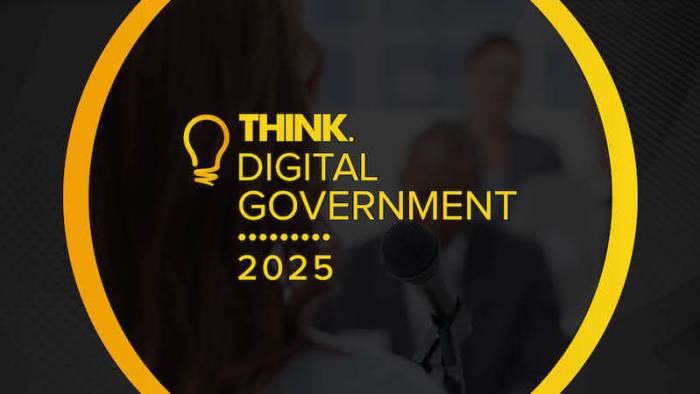As the UK public sector continues to navigate the complex terrain of transformation, Think Digital for Government returns to Westminster on November 12, 2025 to explore what’s next for digital public services.

Hosted by Think Digital Partners, the one-day event at One Great George Street, London (pictured), brings together senior leaders from central and local government, digital experts and solution providers to discuss how technology, data, and collaboration are reshaping the way citizens interact with the state.
Founder Matt Stanley said this year’s event reflects how far government has evolved since the early days of service digitisation – and how much further it needs to go.
“I’m really looking forward to our next Think Digital Government conference on November 12,” said Stanley. “This event will explore how government digital services have evolved beyond the original ‘digital by default’ vision. As AI and data sharing enable more personalised, connected citizen experiences, new challenges around inclusion, privacy, and ethics have emerged. Speakers will discuss how to overcome skills gaps, legacy systems, and vendor lock-in – at a time when digital transformation is more vital than ever to delivering government policy. We have some fantastic speakers from across both central and local government sharing their insights and learnings on what will be a very impactful day.”
Leadership for a New Digital Era
Setting the tone for the day, Anais Reding, chief digital officer – Business Growth Portfolio, Digital, Data and Technology at the Department for Business & Trade, will explore how the rapidly changing digital landscape is demanding a new kind of leadership.
Reding said a rapidly changing digital landscape demands a different kind of leadership.
“We’ve entered a new digital era – and as digital leaders, it’s on us to name that change and help our organisations adapt to a new reality,” she said.
That shift begins with rethinking the definition of services. “Most services today are digital, yet in most organisations, digital, data and technology continue to be seen as an operational function, brought in once solutions are identified. As a result, we often miss the opportunity to think more creatively about the capabilities that can meet outcomes,” said Reding. “We need to start with outcomes and measures of success and then design the channels that achieve them.”
Building user-centred, joined-up services requires closer collaboration between professions – but that can be challenging when each discipline holds on to its own language and way of working.
“Modern services depend on collaboration across professions, but we often hold too tightly to our own specialisms and language. We need more T-shaped leaders at senior levels who can bridge disciplines and bring teams together as one service organisation,” said Reding.
And in today’s environment, every digital service is powered by data, so leaders need to be fluent in both. “We need to retrain ourselves for the kind of leadership this era demands,” said Reding.
“In transforming our online offer for businesses and tackling the economic growth priority, we’re seeing where our old ways fall short — and what it really takes to deliver in the new digital era.
“Coming together in these forums we get a chance to share where we’re facing similar challenges, and play around with slightly different ways of resolving these, so together we can make our progress faster, and through a stronger support network.”
Do Once, Share Widely
In the session on cross-government collaboration, Madeline Hoskin, assistant director for technology at North Yorkshire Council, will discuss how partnerships between local and central government can unlock scale and impact.
“With public services under increasing pressure, it has never been more important for local and central government to work together to deliver smarter, more sustainable digital solutions,” said Hoskin.
“Events such as these create a catalyst for it to happen, bringing people together to share ideas and spark creativity. In my session I will be talking about the power of ‘do once and share’ right across government – how we can reduce duplication, scale what works, and maximise impact through convening and collaboration.
If you liked this content…
“I hope attendees leave with a renewed belief in the value of collective action, and the role digital innovation can play in transforming how we work and serve our communities.”
Inclusion as a Digital Right
Ensuring that every citizen can access digital public services is another central theme. Jess Flack, digital inclusion lead officer at Essex Digital Service, joins a panel focused on accessibility and inclusion, highlighting how equality of access is fundamental to government’s digital ambitions.
“The Think Digital Government events provide a fantastic opportunity to learn, share best practice and network,” said Flack.
“The Department for Science Innovation and Technology recognises the importance of digital inclusion in enabling equal access to public services, equal opportunities and in growing the economy. With the introduction of digital ID, it’s paramount that we ensure that we are supporting citizens who are unable to access an affordable device, connectivity or who lack the skills or motivation to get online safely. Our digital services must be both accessible and inclusive.”
Breaking Down Barriers
Collaboration isn’t just for government departments — it extends to suppliers, delivery partners and citizens themselves. Rheanna O’Donoghue, delivery partner at Hippo, will contribute to the innovation and co-design track, urging a more open, collaborative approach between public and private sectors.
“These conversations are crucial right now because financial pressure means every public pound must be treated with respect, requiring honest, creative dialogue to solve challenges effectively,” she said.
“The central message would be that breaking down ‘us/them’ silos (between departments and with suppliers) is essential, as sharing best practices and learnings is the only way for the public sector to become collectively better and more efficient.”
Transforming Together: Collaboration at the Core of Change
In her session, Amanda Payne, government services director at Gain, will explore how collaboration and open dialogue can drive real change across the public sector. She said the conversations happening at events like this are essential for tackling long-standing barriers to transformation.
“These conversations about the future digital transformation in government are important because everyday challenges like outdated systems, slow processes, and loads of paperwork make it tough for people to get stuff done and for public sector teams to work efficiently. By talking about how to use new digital tools – public services can become much easier, faster, and more reliable for everyone.
“When leaders, tech experts, and frontline staff come together to share ideas, it gets everyone thinking about tackling big issues – like making services more accessible, dealing with security risks, bridging the skills gap, and using AI responsibly. These conversations spark new ideas, highlight what’s possible, and help us all learn from each other’s successes and mistakes.”
Payne says she’ll be encouraging delegates to think differently about what transformation really means.
“I’ll want the audience to walk away feeling excited and empowered about what’s possible for public services.”
A Day for Digital Leaders
With sessions spanning AI, data sharing, service design, legacy modernisation and digital inclusion, Think Digital Government 2025 offers a packed agenda aimed squarely at those leading transformation in public services.
Whether you’re a digital strategist, service designer, CIO or programme delivery lead, the event provides practical insights and peer connections to help shape the next phase of digital government – one defined not only by technology, but by trust, inclusion and collaboration.
Here’s the full agenda and registration.








